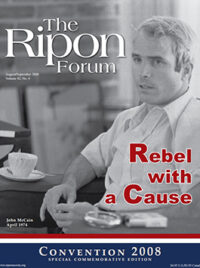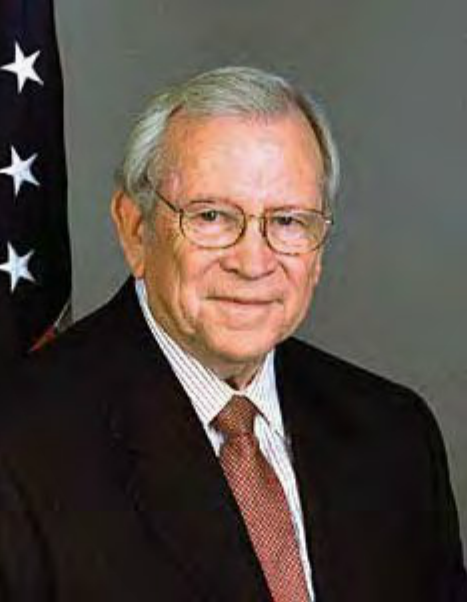Howard H. Baker, Jr. served three terms as a United States Senator from Tennessee (1967-1985) and was Tennessee’s first popularly elected Republican Senator.
Senator Baker gained national recognition in 1973 as Vice Chairman of the Senate Watergate Committee. Three years later, he was keynote speaker at the Republican National Convention and was a 1980 candidate for the Republican presidential nomination.
I’m a life-long and proud Republican. Unlike some, however, I don’t believe loyalty to party precludes common sense decision and policy making.
He concluded his Senate career in 1985 after two terms as Majority Leader (1981 to 1985) and two terms as Minority Leader (1977 to 1981). He was President Reagan’s Chief of Staff from February 1987 to July 1988. From 2001 – 2005, he served as America’s 26th Ambassador to Japan.
Over the course of his long and distinguished career, Senator Baker’s reputation for straight-talk, candor and honesty not only earned him the respect of his colleagues in Washington, but the admiration of the American people and countless others around the world. Moreover, his ability to bring people of different viewpoints together also won him a nickname – “The Great Conciliator.”
It was in the spirit of conciliation that Senator Baker, along with former Republican Senator Bob Dole and former Democratic Senators George Mitchell and Tom Daschle, announced earlier this year the establishment of The Bipartisan Policy Center (BPC), a new organization whose sole purpose is to find common ground between the parties on some of the most pressing challenges facing our country.
The Forum recently asked Senator Baker about the BPC, why it was established, and what he hopes it will accomplish.
RF: What is the purpose of the Bipartisan Policy Center?
HB: Too often, partisanship poisons our national dialogue. Unfortunately, respectful discourse across party lines has become the exception – not the norm. To confront this challenge, the Bipartisan Policy Center was formed to develop and promote solutions that would attract the public support and political momentum to achieve real progress. The BPC acts as an incubator for policy efforts that engage top political figures, advocates, academics and business leaders in the art of principled compromise. In addition to advancing specific proposals, the BPC also is broadcasting a different type of policy discourse that seeks to unite the constructive center in the pursuit of common goals.

RF: How do you hope to impact the public policy debate in Washington?
HB: I’m a life-long and proud Republican. Unlike some, however, I don’t believe loyalty to party precludes common sense decision and policymaking. Some of our Nation’s greatest triumphs have come when political leaders have not allowed partisan differences to deter their efforts to find solutions that are in the Nation’s best interest. Throughout my time as Senate Majority Leader, I took pride in seeking and heeding the advice of my colleagues from the other side of the aisle. Unfortunately, it would seem that now-a-days in many instances, times have changed and partisan rhetoric in Washington now often impedes our public policy making process.
RF: Aren’t partisan differences – and the debate and discussion over these differences – an essential part of our democracy?
HB: Loyalty to one’s party is critical. Adlai Stevenson once called partisanship “the lifeblood of democracy.” Differences between individuals should be civilly debated, but it is critical one never loses respect for a colleague’s opinion. It is important to note that the Bipartisan Policy Center does not espouse what some have called a “trans-partisan” or “postpartisan” model. We believe that principled debate and compromise does not require one to abandon his or her party. Moreover, we seek to encourage a return of comity to congressional debate that we believe has eroded in the last decade.
RF: With the 2008 election season already upon us, are you concerned that any effort to promote bipartisanship is going to take a back seat to the rough and tumble of the presidential campaign?
HB: There will always be partisan debate; that is the nature of the presidential selection process. I think both Democrats and Republicans agree, however, that the majority of the American people are looking for pragmatic and principled leadership in their candidates. They want congress and the president to work with each other; not against each other.
RF: Have you been in touch with any of the presidential candidates or the leadership in Congress to discuss what you are trying to do? If so, what has been the reaction?
HB: The BPC has several ongoing specific policy projects; one focusing on energy policy, one on agriculture policy, one on ways to reform national security and one on transportation. We select issues that we believe are ripe for partisan agreement. To this extent, the BPC conducts research and evidence-based surveys to compose thoughtful and pragmatic solutions that are then passed on to current members of Congress for their consideration. Furthermore, the BPC has recently formed a working relationship with the Senate Common Ground Coalition – a group of approximately twenty sitting U.S. Senators who largely share the same goals and vision as the BPC. We are excited about this new endeavor.
RF: Why is it in the best interests of Republicans to work cooperatively with Democrats at a time when many believe that the best way for the GOP to reclaim their congressional majority is by sharpening political differences between the two parties and denying the Democrats any chance of legislative success?
HB: Our most valued public servants – whether Democratic or Republican – should be inspired by just such a sense of duty, a sense of service and a deep desire to do what is right for our Nation, whether it is politically advantageous or not. I believe the BPC will serve as an important mechanism in promoting common sense public discourse. I look forward to working with my colleagues on issues that are vital to this great country. RF





